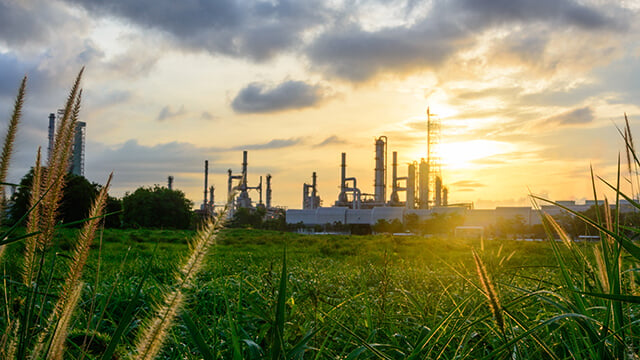Crude oil refineries
Crude oil refining accounts for 6-8 % of all global industrial energy consumption, with energy costs adding up to 50% of total OPEX for some refineries. Improving energy efficiency is therefore critical for all refineries and in all processes, with a focus on the main energy consumers. Atmospheric and vacuum crude distillation, for example, often represent as much as 30% of a refinery’s total energy consumption. Optimizing processes in the right way, however, can reduce this by as much as 25%!
Alfa Laval has a long experience of partnering with refineries to optimize these vital processes to maximize the potential efficiency of modern solutions. By using compact, welded plate heat exchangers that offer up to five times the efficiency of traditional shell-and-tubes, we have helped customers dramatically reduce both energy use and CO2 emissions. This also provides a wide range of secondary benefits, such as increased production capacity, improved product yield and quality, more reliable process uptime, and reduced project investment cost.
See the numbers: energy efficiency potential in refineries
Did you know that every year, Alfa Laval’s installed plate heat exchangers save refineries 54 TWh of energy, compared to what they would consume with less efficient, conventional heat exchangers? The corresponding reduction in CO2 emissions is over 13 million tonnes.
Imagine if every refinery switched to more efficient, compact welded plate heat exchangers for all of their processes. We could reduce energy consumption by 23% and global carbon emissions by 245 million tonnes. That’s the equivalent of what the entire country of Spain emits in a whole year!
Want to learn more about how Alfa Laval can maximize the energy efficiency of refineries? Download our infographic to see more numbers.
Customer cases
Meeting environmental goals in the oil refining industry
The Hengli Group is one of China’s largest oil refiners, and the company has ambitious sustainability targets. In fact, their goal is “to maintain standards higher than the environmental protection regulations of the Chinese government.” Read the full story to learn how they reduced energy consumption by 30% after maximizing efficiency in the crude distillation unit of their new state-of-the-art refinery on Changxing Island.
Refine and reduce: How higher energy efficiency ultimately leads to lower costs
For Sweden’s largest fuel company, replacing four existing shell-and-tube heat exchangers with just one compact plate heat exchanger from Alfa Laval translated to energy savings of 7 MW. It further enabled them to cut CO2 emissions by 14,600 tonnes per year. Take a look at their story to find out how they took advantage of Alfa Laval’s expertise in optimizing energy efficiency in refineries.
Enhancing efficiency at America's number one oil refiner
The Valero Energy Corporation began as a small regional oil refiner in the American southwest. Today, it is an industry leader, setting high standards for corporate responsibility and environmental sensitivity. Learn how their close relationship with Alfa Laval has enabled them to maximize energy recovery through thermal efficiencies well above traditional industry standards.
Our solutions
Alfa Laval Compabloc
Alfa Laval Compabloc is the champion of heat exchange: a technically proven, highly efficient solution at high pressure or temperatures, including for high-fouling services with tough media. Today there are more than 2600 Compabloc heat exchangers installed in critical refinery processes. Of these, more than 1000 are in crude distillation processes, where their improved energy efficiency enables refineries to cut CO2 emissions by at least 25% compared to traditional solutions.
Welded spiral heat exchangers
Alfa Laval spiral heat exchangers are designed to handle the most high-fouling heat transfer challenges. With the unique design, they eliminate flow maldistribution, thereby minimizing fouling deposition, regardless of if one or both fluids are high-fouling. As such, our spiral heat exchangers always keep efficiency and availability at maximum levels. In some processes, such as residue hydrocracking, they can even help you maximize conversion rates and product yield.
Alfa Laval Packinox
A Packinox heat exchanger is ideal for large combined feed-effluent heat recovery duties in catalytic reforming and aromatic production processes. Its outstanding thermal performance, superior hydraulic efficiency and compact footprint allow you to optimize energy efficiency and maximize process capacity at the lowest environmental footprint. A Packinox recovers more heat at a lower cycle pressure drop than traditional solutions, resulting in reduced investment needs for the feed furnace and recycle gas compressor capacity.
Discover the benefits of partnering with Alfa Laval
The efficiency of your refinery’s processes is key for staying competitive today, and there are often big opportunities for improvements. By designing your refinery processes to fully exploit the most efficient solutions available, you can substantially increase both profitability and sustainability. With Alfa Laval as your partner, you get access to world-leading expertise in process optimization. Involve us early in the basic process design to take advantage of our unique know-how.

Енергоефективність
Екологічно чиста енергія
Партнерство у галузі сталого розвитку
Зв'яжіться з нами, щоб дізнатися більше
Зв'яжіться з нами сьогодні, щоб отримати додаткову інформацію про рішення для сталого розвитку.
